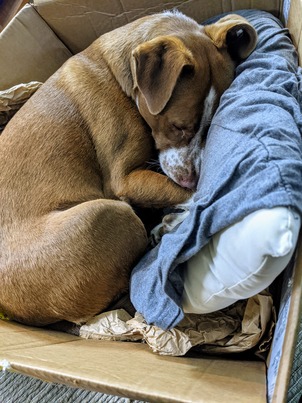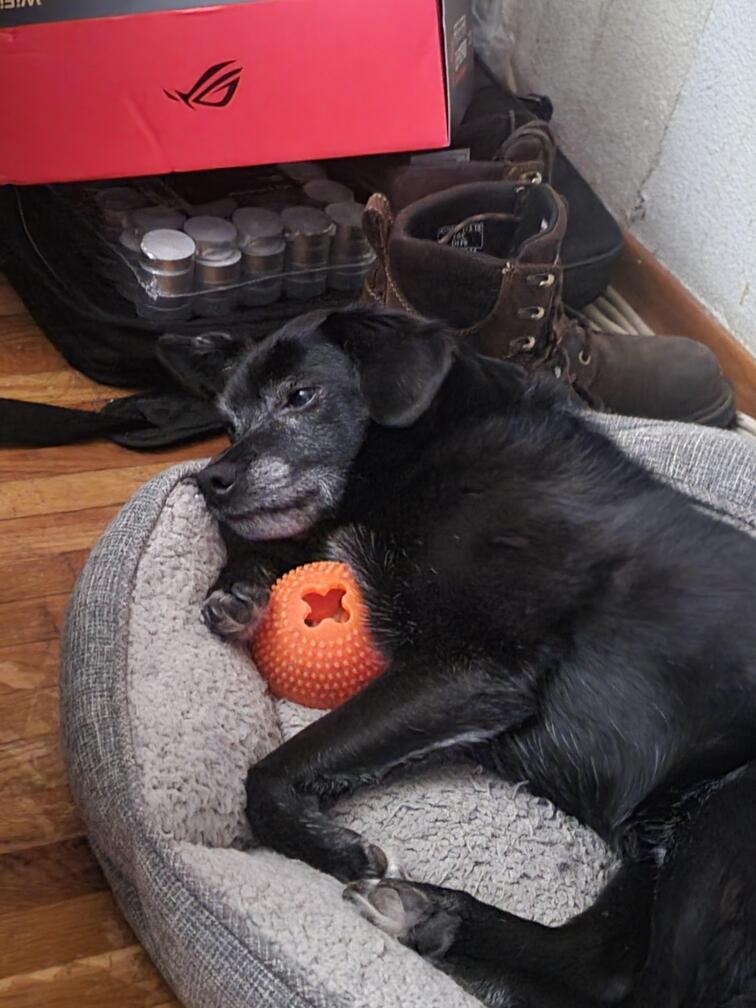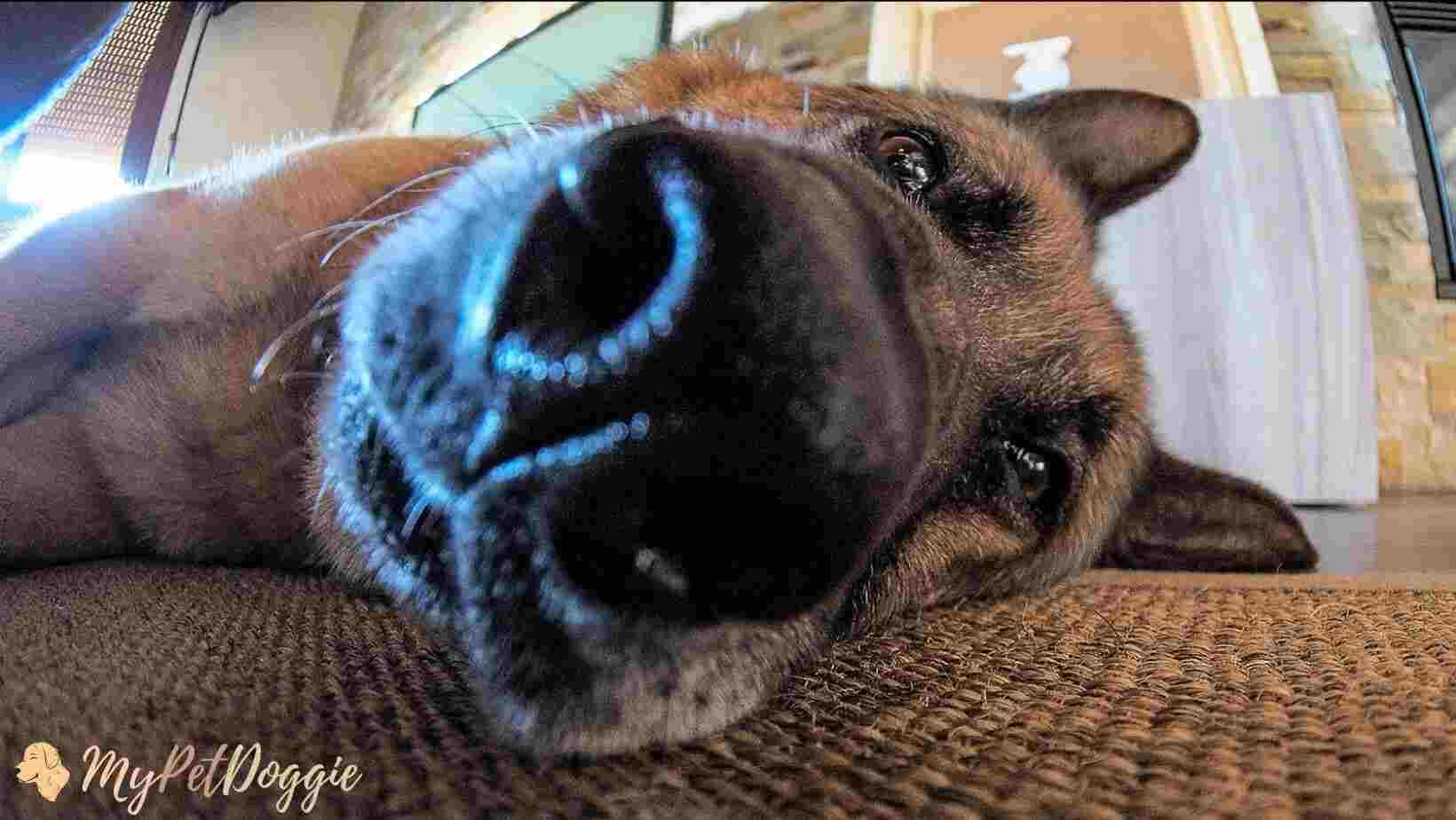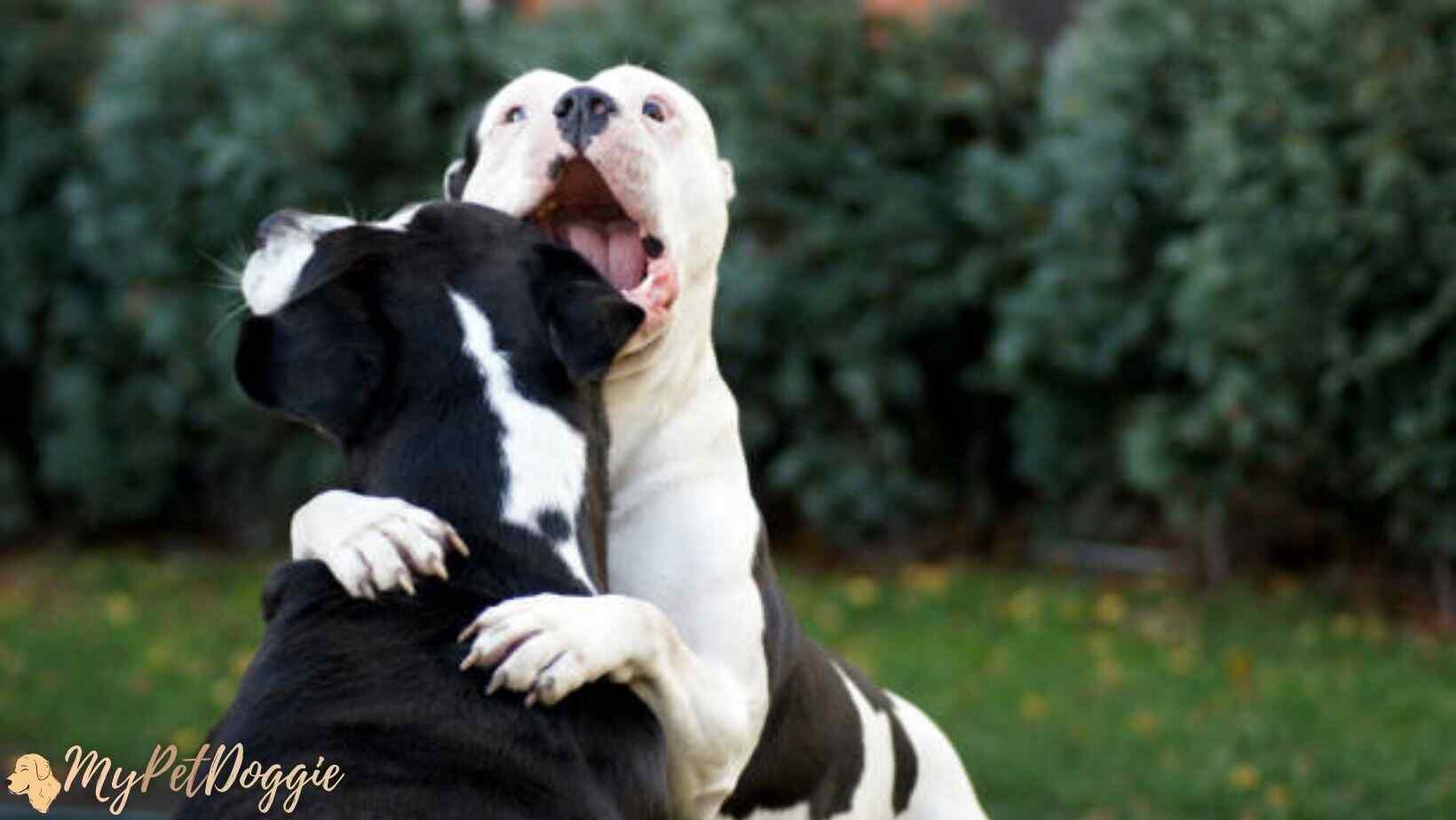About the Author: Introducing Dr. Adriana Luis, our Senior Content Editor at MyPetDoggie and also Veterinarian (MVZ). Kerry devotes most of her time to penning enlightening pieces about pet health, providing invaluable knowledge to pet owners globally. As the director of our Veterinary Content Team, she ensures the accuracy and comprehensiveness of our content, thereby making pet care accessible and understandable for everyone.
Are you that new dog parent in town whom everyone is avoiding because you can’t stop asking ‘’why does my dog cry in his sleep?’’, and someone terrified you saying that dogs cry in their sleep because they can anticipate someone’s death, well, that’s just a myth, and take it as a joke.
We kid you not, and we understand that the dog parents get worried when they initially notice their furry friends making whimpering sounds in their sleep. You’re not overthinking, and it’s completely normal for dog parents to keep a deep eye on their four-legged friends.
However, we suggest you be relaxed as this is not-so-odd canine behavior at all. But, yes, sometimes, the crying and whimpering aren’t normal and indicate something that needs your utmost attention. Here, we get you covered with almost all routine, and peculiar reasons for your dog crying in his sleep.
Why Does My Dog Cry in His Sleep?
Your dog cries in his sleep due to dream activity, including rapid eye movement (REM) sleep, which is normal and similar to humans. It could be a reaction to dreams, such as getting caught, thunderstorms, fireworks, or feeling anxious. If it happens frequently, you should consult a vet.
4 Reasons Behind Your Dog Crying in His Sleep

Dreamy World of Pups
Dogs dream while they sleep. Sounds fake? Well, a number of behavioral veterinarians, and neurological specialists confirmed their dreams already, and you can even know when your dog’s dreaming. The service chief of the University of California, Dr. Lize confirmed that dogs while dreaming show muscle twitching, tail wagging, lip movement, and whimpering. So, when you see your dog crying in his sleep after a regular interval, expectedly when they are in their REM (rapid eye movement) phase, they’re most probably dreaming.
Now you probably wonder what your dog dreams about. Well, dogs like to relive the experiences they have in real life like us humans. So, when you see your dog twitching muscles, moving eyes, making sounds, crying or even moving his legs, you will know that in his dream he’s either chasing a squirrel, or his toys. The clinical experiment was done by temporarily paralyzing the part of the brain, pon, that’s responsible for controlling muscle movement during sleep in animals and humans. The results surprised us that dogs act on their dreams by showing movement.
But, sometimes, dogs make terrifying crying sounds that show that they are having a nightmare. Avoid touching your dog in this state, and recall his name politely to make him come back to reality.
Discomfort
Your dog might be uncomfortable at the place he sleeps. his sleeping rug is either too rough for his skin, or the comforter you put on him is either too heavy, or hot for his body, or maybe the room temperature is too cold for him to bear There can be a chance of him allergic to the fragrance you spray on bedtime. So, whatever, the reason is, your dog will try to communicate by showing the signs of discomfort, i.e. crying or barking in sleep.
This point is considered valid if a dog whimpers at bedtime at night especially, and remains normal when he’s awake. So, if you remove the causative agent of discomfort, you can witness him having a normal sleep with less whimpering.
Pain
Pain can be a causative factor behind your dog’s crying in his sleep. He might be suffering from some muscle pull, or hidden injury that you can’t witness superficially. There’s a chance that he’s either suffering from metabolic issues or maybe skeletal issues like arthritis which is common in aged dogs.
But to confirm, you need to keenly invigilate the behavior of the dog. If he cries regularly, and intensely. We hope before self-diagnosing the dog’s problem, you’re fully aware of the difference in whimpering the dogs make regularly or occasionally. Otherwise, better to consult a professional behavioral veterinarian.
A helpful tip we like to handover you here is that if by any chance, your vet can’t diagnose the problem, ask him to perform a test by using a nonsteroidal anti-inflammatory drug on him. If your dog shows comfort after the medicine is administered to him, it’s a sign that his whining is pain-related.
Emergence of Abrupt Noise
‘Why does my dog cry in his sleep?’ is something you have asked many, but have you ever wondered about your surroundings? You might think that your dog is safe in your house, but if you’re based in a location that has noise pollution, and noise more than average decibels, you might have surrendered to the environment, but your dog can’t adjust to it because he’s bestowed with extraordinary hearing ability.
The secret behind his hearing is his ears have 18 muscles, and he has the power to adjust or tilt his funnel ears. Sounds amazing? Yeah, it is. But this hearing ability might terrify him in sleep as factors like sudden abrupt noises, unfamiliar voices, and sounds that you can’t hear but your dog can hear add fuel to the fire. So, keep a check on the noise particularly when your dog is sleeping, and you will not be disappointed.
Why Does My Dog Bark in His Sleep?
A dog’s vocalization is important to comprehend what he’s trying to communicate. Dog parents can easily analyze what a dog wants to convey as per the sound they make via their vocals.
However, in sleep, dogs show barking, whimpering, growling, and crying phenomena. The message, this barking or crying sound, conveys the same.

However, in the case of the barking phenomenon exclusively, it’s noted via clinical experimentations that dogs have a higher tendency to be the victim of Separation Related Disorder (SRD).
Domesticated animals like dogs have a greater chance of being the prey of this disorder because they develop emotional bondage with their parents siblings, and even owners. However, when they are separated from their owners, homes, and friends, they record their protest by barking or intense vocalizing.
However, if your dog has not experienced separation recently, barking in sleep is yet a normal canine behavior. However, if the barking is frequent, and is too annoying to bear, then get your dog a safe distant place, but keep in mind that don’t introduce sedatives and drugs to make him fall asleep quietly.
However, if you think the repetitive barking phenomenon is too quirky for your dog to do, then note his barking timings, duration, and triggers, and take professional advice from a practicing veterinarian.
Is My Dog Having a Bad Dream?
There’s a chance that your dog is having a nightmare, but no one can confirm it. However, since pet owner knows their dog’s usual behavior better when they notice peculiar behavior that your dog doesn’t show in their usual sleep like muscle twitching, excessive barking, excessive deep breathing, leg movement, and paw scratching, most probably it means your dog is having a dream.
There’s still hope that the dog might be happy in his dream, he might be running behind squirrels, catching his toys, roaming around dog parks, and communicating with someone by barking, and the chance of him being terrified in a dream is also here. He might be trying to combat his hostile neighbor dog in a dream, or trying to rescue himself from unknown danger, or he might be reliving his past traumatic experience. So, if you observe this behavior of your furry friend routine-wise, record him, and show your vet to get professional help.
Should I Wake My Dog Up From a Bad Dream?
Please NO! Control the urge to wake your dog up from sleep when you feel like he’s experiencing some unpleasant phenomenon in his sleep because if you try to wake your dog up, instead of getting calm, his body perceives it as a foreign attack. A dog isn’t as intelligent as a human, so his brain doesn’t comprehend things with the speed we do. So, due to being terrified, he can nip you.

However, if you think you can’t help it, and can’t see your dog in such a situation, we suggest you only tame your dog by politely calling his name, and don’t dare to touch him for your and his wellness.
Other Signs Your Dog Is in Dreamland
There’s no surety that we can give you about your dog being in dreamland, but there are some signs that are considered as the dog’s sign of having a dream, and most animal behaviorists agree on it.

REM-Rapid Eye Movement Stage
REM is a stage of the sleep cycle when dogs like humans dream about stuff. In this stage, the brain activity is higher, and the brain acts extra smart and makes dogs have dreams. REM occurs after 45 minutes in dogs, as they have shorter sleep cycles than us. In REM, you can also see dogs moving their eyes behind their eyelids.
Tail Wagging and Body Movement
Tail movement is a clear sign that your dog is experiencing something in his visual imagery. However, tail wagging often relates to dogs being relaxed, on the other hand, body movements like light stretching, muscle twitching, and leg movement show that the dog is trying to run around in his sleep which shows he’s having a dream.
Whimpering and Vocalization
Dogs communicate through vocalization normally, and experts can differentiate the differences in their vocalization. These behavioral experts often deduce rightly what these sounds mean after showing the condition your dog is going through.
Thus, while Dog dreams, he also whimpers, barks, or cries. However, if your dog doesn’t belong to the breed that often barks, then his excessive barking in sleep could be a sign of him having a nightmare. Thus, the dog channels his inner energy, either peaceful or chaotic, through vocalization.
Facial Expression
You might have come across adorable videos of cute dogs that make funny facial expressions while sleeping. These facial expressions, simile, curiosity, annoyance, and intriguing signs on the face make them amusing, but it also indicates that the dog is going through the phase of dreaming.
Increased Breathing
Usually, dogs dream in the rapid eye movement(REM) phase, which is the second phase of the sleep cycle, which you can say is characterized by higher brain activity and a relaxed body. Dogs can’t act out their dreams in this phase, and this is generally characterized as ‘’good sleep’’. However, you can get the clue if you concentrate, and note down your dog’s breathing rate. Breathing usually gets shallower in the state of a dog’s dreaming, and the rate of breathing increases.
However, this could be a positive sign in terms of the dog’s sleep quality. In other words, the dog is so sleepy that he’s not awake even with the unusual breathing he’s having.
Sudden Awakening
You might have noticed weird moments when your dog gets awake suddenly without any external stimuli, and he bewilderedly sees everything around with a birds-eye view. This is taken as a sign that the dog is just awake from a nightmare either trying to defend himself from a furious animal, or it might be possible that he’s awake to play with his toys.
Unresponsive to External Stimuli
Dogs like humans experience dreams in REM, when the brain activity is at maximum, but body movement ceases due to muscle relaxation. Healthy sleep is characterized by a sound and undisturbed prolonged sleep cycle that can’t be disrupted easily. Thus, if your dog shows unresponsiveness to external stimuli exclusively in rapid eye movement, it means your dog is having sound sleep. However, sudden awakening or quick response to external stimuli might be a sign of a dog’s stress, and REM sleep disorder.
7 Tips for Dealing With Dogs Who Whine During Their Sleep
Intense unpleasant vocalizing behavior is seen in many dogs, and behaviorist veterinarians formulated some tips for dog parents to combat this problem. Some of them are discussed:

Observe the Behavior
If you notice your dog whining during their sleep, observe their routine. Analyze if he’s whining persistently, or if he shows this behavior on and off. If his whining behavior is questionable for you, note down his routine, and analyze if there’s some particular activity or thing that’s making him extra excited and aggressive. If you closely monitor, there’s no rocket science to reach the root cause. Thus, the best organic helping technique is removing that trigger from his sight.
Monitor Sleep Environment
Sleep environment matters a lot for healthy and sound sleep in the case of humans and dogs as well. If your dog is sleeping at a place where frequent horn sounds make the environment clumsy, his sleep will be compromised. Also don’t compromise on his bed, and blanket’s quality, and send his couch, and blanket for laundry regularly. Dogs catch allergies, and skin ailments from infectant in the environment. Thus, make sure the environment is sleep-friendly for your dog from all perspectives.
Rule out Medical Issues
Keep an eye on his health, if he shows whining behavior repeatedly. There could be a reason that he’s suffering from underlying health problems that he’s trying to communicate like this. There might be a muscle pulling that usually hurts when he’s lying calmly, and all his body is relaxed. There might be a problem with his paws, or there’s a chance of an allergic reaction that he shows by whining at night. Thus, if you can’t find out the problem, we suggest you book a visit with your animal consultant.
Avoid Disturbing Them
Some dog parents like disturbing their dogs’ sleep, and making their dogs wake up before time, Dogs express their destitute by facial countenance, but instead of taking it as a sign to stop, dog parents find it cute. Please refrain from this practice, and don’t casually disturb your dog’s sleep for fun, because dogs guard their neurological system against these stimuli, and start barking and whining to battle against this behavior.
Practicing Calming Techniques
This tip might work for you, as this tip is widely popular among humans for their use, and for their pets as well. You should start aromatherapy to calm your dog, and try playing white noise, so he remains unbothered from traumatic voices. You can also babysit your dog with gentle touches when he’s sleeping to make him feel at home. However, avoid touching your dog when you realize he’s having a nightmare.
Limit Late Night Stimulant
Scientifically, there’s a cause for everything, so if a dog starts whining out of nowhere, there must be stimuli behind it. There could be stimuli like late night hunger, thirst, intense light in the room, changing temperature, and you being laughing in your lounge with your friends at night parties, that are proven displeasing for dogs, and they communicate about it by developing the habit of whining in their sleep.
Book Professional Appointment
If ignoring your dog’s whining isn’t bringing any peace, then consult a veterinarian who can mitigate your problem with a medical prescription. Don’t administer drugs to your dog without an animal health care professional.
Common Question:
Can dogs have bad dreams?
Yes. Dogs experience dreaming phenomena, and they see in dreams what they are experiencing in real life. If your dog has a traumatic or abusive past, there’s a higher chance of him being engaged in brawls and fights in his dreams. However, sometimes, casual life events that he experiences in his daily life influence greatly his dream frequencies and nature.
What causes night terrors in dogs?
Night terrors are often witnessed and studied in dogs. However, definite reasons haven’t yet come to the surface, but repetitive behavior that your dog shows while sleeping tells if he experiences night terror or not. If you observe your dog having muscle twitching, legs stretching, vocalizing barks, excessive but shallow breathing, and he wakes up suddenly, it means that he’s either battling with past trauma, stress, and anxiety, or neurological problems like epilepsy, as intense pain terrifies the dog badly.
Do dogs sleepwalk?
Yes, dogs show sleepwalk phenomenon like humans, but they don’t sleepwalk the way humans do. Dogs show movements like muscle twitching, leg movement as he’s running, and even panting Make sure that the dog is either walking or sleeping in his dreams and that even his body starts showing the symptoms of intense walk.
Should i pet my dog while sleeping?
You can pet your dog when he’s about to sleep. Your touch and attention will make sleeping stress-free for him. However, if your dog shows signs of having a nightmare, please suppress the urge to touch your dog, and just call him by his name to wake him up.
Why does my dog whimper and twitch in his sleep?
Your dog vocalizes and shows muscle twitching because he’s surely having a dream. It’s a sign that your dog is having a sound sleep, and ignore whimpering, and muscle twitching, if it happens for a moment in sleep, as this is characteristic behavior of dogs.
Wrapping up
Your dog cries in his sleep because of many problems, but remember that neither of them is life-threatening. You can home-train your dog to stop whimpering with our shared tips, But, if the behavior of the dog is getting tense, then don’t hesitate to book a professional appointment.






